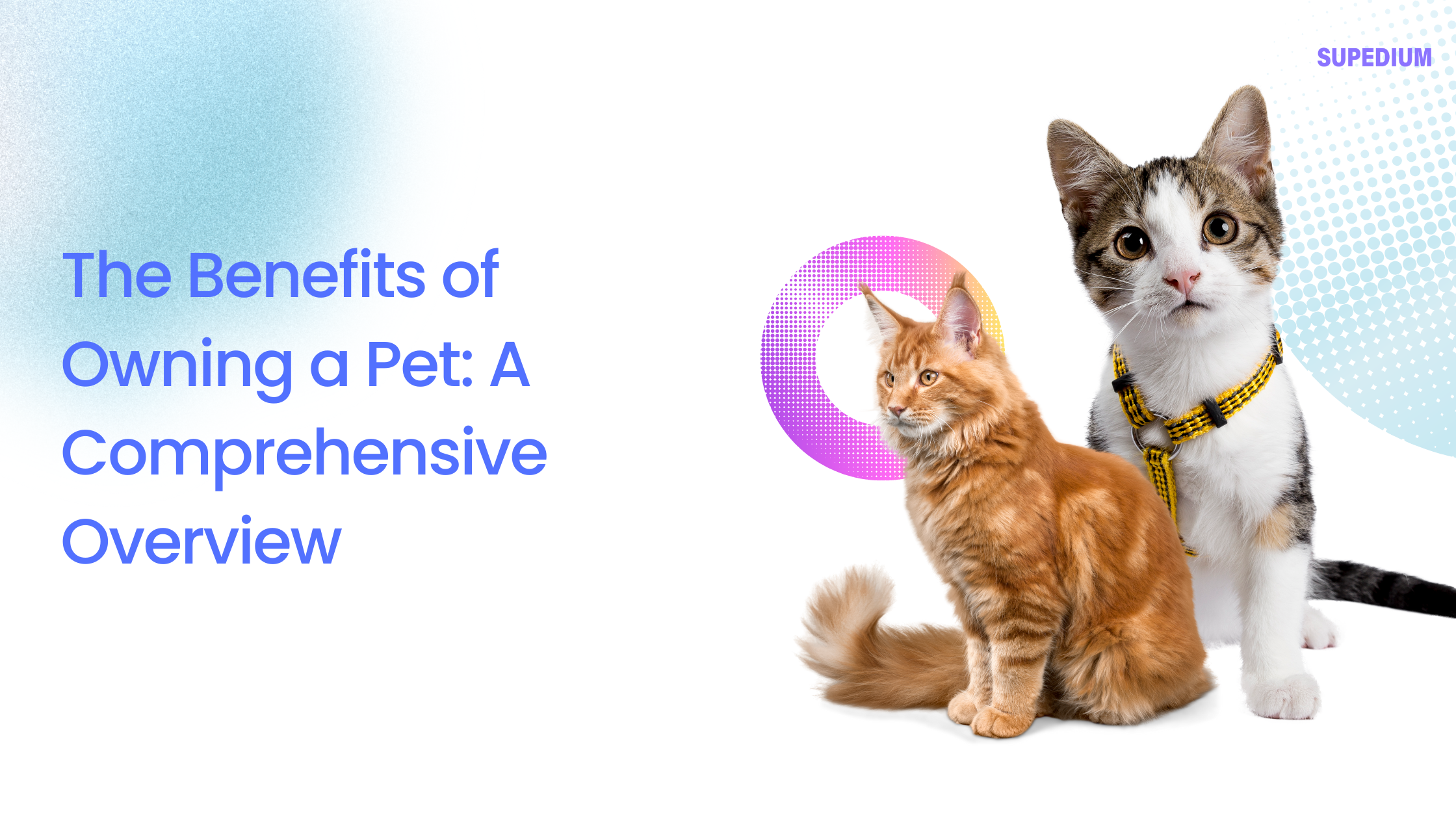Table of Contents
![]()
Pet ownership is a cherished experience for many, offering a wide array of benefits that extend beyond the simple joy of companionship. From physical health improvements to emotional support, pets enrich our lives in numerous ways. This article explores the multifaceted benefits of owning a pet, detailing how they contribute to our well-being and overall quality of life.
Physical Health Benefits
1. Increased Physical Activity
One of the most direct benefits of pet ownership, especially dogs, is the increase in physical activity. Dogs require regular walks, playtime, and exercise, which naturally encourages owners to stay active. This daily exercise can help with weight management, improve cardiovascular health, and increase overall fitness levels. Studies suggest that dog owners are significantly more active than non-dog owners, contributing to a healthier lifestyle.
2. Lower Blood Pressure and Stress Levels
The presence of a pet can lead to lower blood pressure and reduced stress. Petting a dog or cat has been shown to trigger the release of oxytocin, a hormone associated with bonding and relaxation. Additionally, the act of petting can lower cortisol levels, a hormone linked to stress. This soothing effect contributes to overall mental and physical relaxation, promoting better health.
3. Improved Cardiovascular Health
Research indicates that pet ownership can positively impact cardiovascular health. Pet owners, particularly those with dogs, have been found to have lower cholesterol levels and reduced risk of heart disease. The physical activity associated with pet care, combined with the emotional benefits of companionship, contributes to a healthier heart.
4. Enhanced Immune System
Regular interaction with pets can boost the immune system. Exposure to the microbes found in pet dander and saliva can help build a more robust immune response, potentially reducing the risk of allergies and infections. Studies suggest that children raised in homes with pets may have a lower risk of developing allergies and asthma.
Mental Health Benefits
1. Reduced Feelings of Loneliness
Pets provide consistent companionship and emotional support, helping to alleviate feelings of loneliness. For many individuals, especially those living alone or experiencing social isolation, a pet can offer a sense of connection and purpose. The companionship provided by pets can be particularly beneficial for the elderly and those with limited social networks.
2. Decreased Risk of Depression and Anxiety
The emotional support provided by pets can be instrumental in reducing symptoms of depression and anxiety. The routine of caring for a pet, combined with the unconditional love they offer, can improve mood and overall emotional well-being. Pet interaction has been shown to release endorphins, which are natural mood enhancers.
3. Increased Sense of Purpose and Responsibility
Owning a pet requires a commitment to their care, which can instill a sense of responsibility and purpose. This routine can provide structure to daily life and help individuals feel more engaged. For many pet owners, the act of caring for a pet provides a sense of accomplishment and satisfaction.
4. Cognitive Benefits
Engaging with pets through training, play, and care can offer cognitive stimulation. Activities such as teaching commands, solving behavioral issues, or playing games with pets require mental engagement, which can be beneficial for cognitive health. This mental stimulation can be particularly important for older adults, helping to keep the mind active and sharp.
Social Benefits
1. Enhanced Social Interaction
Pet ownership often leads to increased social interaction. Dog owners, in particular, frequently engage with other pet owners during walks or at dog parks. This social aspect can foster new friendships and create a sense of community. Pet-related events and activities also provide opportunities for socialization and engagement with others.
2. Strengthened Relationships
The shared experience of caring for a pet can strengthen relationships among family members and friends. Pets can serve as a common interest that brings people together, promoting collaboration and bonding. Families with pets often find that the responsibility of pet care fosters closer ties and improved communication.
3. Positive Impact on Children
Pets can have a significant positive impact on children. They provide a unique opportunity for children to learn about responsibility, empathy, and care. Children who grow up with pets often develop a greater sense of compassion and a better understanding of the needs of others.
Emotional Benefits
1. Unconditional Love and Companionship
One of the most profound benefits of pet ownership is the unconditional love and companionship that pets offer. Unlike human relationships, pets provide a non-judgmental, constant source of affection. This unconditional love can be a powerful source of comfort and emotional support.
2. Reduction in Stress and Anxiety
The presence of a pet can have a calming effect, helping to reduce stress and anxiety. The act of spending time with a pet, whether through petting, playing, or simply being in their presence, can help lower stress levels and promote relaxation. Pets often provide a sense of security and stability, which can be particularly comforting during challenging times.
3. Increased Happiness and Joy
The joy and happiness that come from pet ownership are often immeasurable. The playful antics, affectionate behavior, and unique personalities of pets bring moments of joy and laughter into daily life. This positive emotional impact can enhance overall happiness and contribute to a more fulfilling life.
Therapeutic Benefits
1. Pets as Therapy Animals
Therapy animals play a crucial role in various therapeutic settings, including hospitals, nursing homes, and schools. These animals are trained to provide comfort and support to individuals in need, helping to alleviate emotional distress and improve overall well-being. The presence of therapy animals can significantly enhance the healing process for patients.
2. Support for Individuals with Disabilities
Assistance animals, such as guide dogs for the visually impaired or service dogs for individuals with mobility challenges, offer invaluable support. These specially trained animals help individuals navigate daily life, increasing independence and improving quality of life. The role of assistance animals is critical in providing practical support and enhancing the lives of those with disabilities.
3. Emotional Support Animals (ESAs)
Emotional Support Animals (ESAs) provide comfort and emotional support to individuals with mental health conditions. Unlike service animals, ESAs do not require specific training but are recognized for their role in providing emotional stability. The presence of an ESA can help individuals manage symptoms of anxiety, depression, and other mental health challenges.
Benefits to Lifestyle
1. Structured Routine
Pet ownership introduces a sense of routine and structure to daily life. The need to feed, exercise, and care for a pet creates a schedule that can help individuals stay organized and disciplined. This routine can provide stability and a sense of purpose, particularly beneficial for those who thrive on structure.
2. Opportunities for Outdoor Activities
Owning a pet, especially a dog, encourages outdoor activities and exploration. Regular walks, visits to parks, and outdoor playtime contribute to a more active lifestyle and offer opportunities to enjoy nature. This increased exposure to the outdoors can have positive effects on physical and mental health.
3. Enhancement of Home Environment
Pets can transform a home environment into a more lively and engaging space. Their presence adds warmth, companionship, and activity, creating a more dynamic and comforting atmosphere. The joy and interaction brought by pets contribute to a positive and fulfilling home environment.
Conclusion
The benefits of owning a pet extend far beyond the simple pleasure of companionship. From physical health improvements and mental well-being to social and emotional support, pets enrich our lives in countless ways. They offer a unique blend of unconditional love, structured routine, and opportunities for personal growth. As you consider the potential impact of pet ownership, it is clear that the rewards of having a pet are both profound and multifaceted.
Share This





Be the first to comment